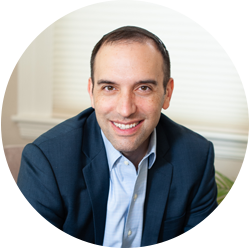Dear friends,
This week, I joined Rabbi Michelle Robinson of Temple Emanuel of Newton for a virtual conversation with journalist and author Evan Osnos about his latest book, Joe Biden: The Life, the Run, and What Matters Now. Based on extensive interviews with Biden and a wide range of other politicians, advisors, and opponents, the book is a portrayal of Biden’s life and career leading up to the 2020 election.
When I originally learned of the opportunity for CJP to co-host this event, I thought of the many conversations I have had with members of our community who have been struggling to make sense of this moment — people with strong political views on one side or another, and people who aren’t sure what they believe but have deep concerns about the future of our country, our democracy, our politics, and our leadership. Many of us are wondering: What will this new president mean for this country that we love? What will he mean for the Jewish community? What can we learn from the president’s life and his leadership about ourselves and our lives?
I believe that these are conversations of consequence that we need to be having and questions we need to be asking. Grounded in Jewish wisdom and values, and informed by reading and learning about history and current events, these conversations will help define the character of our community for decades to come. That was the spirit of Evan Osnos’ book and our conversation this week.
Our discussion addressed Biden’s politics and policies, including how he might approach our long-standing relationship with Israel, the Middle East, and Iran, as well as racism and antisemitism here at home. We talked about his belief in the power of relationships as the locus of where leadership and positive change happen. If we are willing to get in the room with, and show respect for, people with whom we disagree — and keep talking, arguing, and compromising — then we can make progress, even on our most complex and ideologically charged issues.
For me, the most powerful moments in the conversation were about the president’s humanity. With heartfelt insights into the president’s inner life, Evan illuminated how loss, grief, failure, and even regret have led to Biden’s vulnerability and his empathy.
Referencing Michael Sandel’s The Tyranny of Merit, Evan's book suggests that President Biden’s prescriptions for America “would be informed by two divergent strands of his biography: the myths that undergird the politics of [personal] responsibility, and his own encounters with misfortune.” In other words, he believes in the power of human agency to control our own destiny and he understands that “there but for the grace of God go I.”
The capacity to hold these two seemingly contradictory truths is also at the heart of our Jewish tradition.
Next week, we will celebrate the holiday of Purim. What Biblical figure reflects human agency and responsibility more than Esther, who courageously takes matters into her hands and changes the course of Jewish history? She hears and responds to Mordechai’s calling: “Who knows if it was precisely for this moment that you have attained your royal position?” In other words, you have the power to change the story, to write the story. What will you do with that power?
At the same time, while the name of God is famously absent from the entire Megillah, we can view that absence as an ironic reminder that the hidden hand of God is always at work. The redemption of the Jews from the hands of evil Haman — this reversal of fortune — is captured by the phrase at the end of the story: “v’nahafoch hu — and the opposite (of what was expected) happened.” Everything turned upside-down.
This phrase is a humbling reminder of just how quickly our world and our lives can change. This can feel miraculous, joyous — even redemptive — as it does in the Purim story. Or, it can feel painful, unfair, or even tragic, as it has at many other points in Jewish history. Regardless, “v’nahafoch hu” should inspire humility and gratitude about our own lives, and empathy and compassion toward others.
We are each responsible for how we play our hands, but we do not deserve credit or blame for the cards we are dealt. These “divergent strands” that have shaped the life and character of Joe Biden are true for all of us.
Shabbat Shalom and Happy Purim,
Rabbi Marc Baker
Stay in touch. Sign up for my biweekly messages, “Together in Community.”

About the Author
CJP President and CEO Rabbi Marc Baker is an educator, writer, and leadership mentor who is devoting his life to Jewish learning and building Jewish communities.
